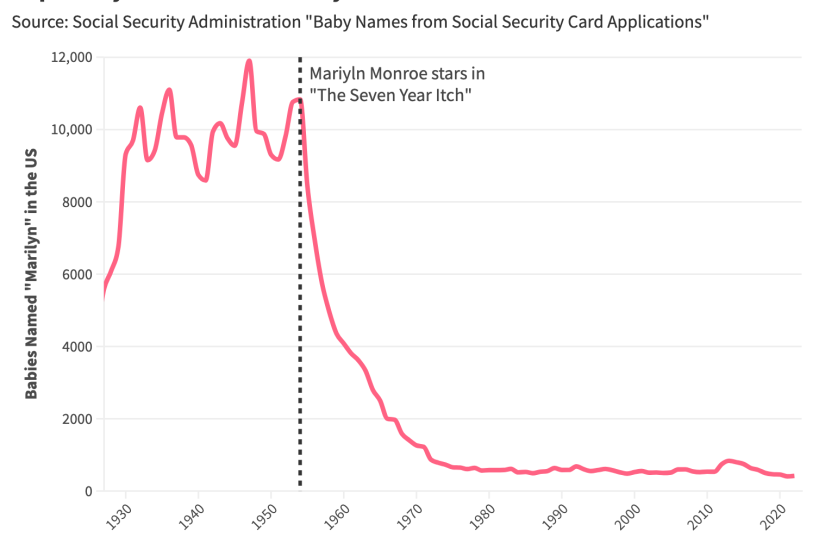Broadly speaking, excessive low-brow tabloid coverage can trigger an immediate decline in the popularity of a name.
Marilyn Monroe rose to fame in the 1950s, becoming a global sex symbol through iconic roles in films like Gentleman Prefer Blondes and Some Like It Hot. Her personal life, marred by high-profile relationships and mental health struggles, made her a constant subject of tabloid fascination.
In 1955, Marilyn Monroe starred in The Seven Year Itch, a movie about a married man's "itch" for adultery. The film is famously remembered for an iconic shot of a street vent blowing air up Monroe's dress.
Curiously, that same year marked the beginning of a sharp decline in the popularity of the name "Marilyn"—its fall inversely correlated with Monroe's rising celebrity.
The specific factors behind Marilyn's declining usage are hard to pinpoint, though the timing suggests that relentless tabloid scrutiny and intense media sexualization likely played a role.
Indeed, persistent press coverage can elevate an otherwise ordinary person into a household name, indelibly linking their name to scandal.
Following the Clinton-Lewinsky affair, the name "Monica" experienced a sharp decline in popularity, a direct result of merciless media attention and widespread public shaming.
Alas, Monica Lewinsky is just one of the scandal's key figures who left a mark on naming trends. Both "Monica" and "Hilary" saw their popularity decline in the wake of Bill Clinton's various scandals, while the forename "Bill" remained unaffected.
Over the past thirty years, few public figures have faced as much scrutiny as Hilary Clinton. Unsurprisingly, this relentless criticism has coincided with a significant decline in the name "Hilary," a trend that began around Bill Clinton's election in 1992.
Curiously, this precipitous drop began well before Hilary's 2008 and 2016 presidential campaigns, the Lewinsky scandal, or her unsuccessful push for healthcare reform as First Lady.
Perhaps Hilary Clinton has always been a polarizing figure—her rise to power immediately rejected by a large swath of the American public. Demystifying Clinton's public image could encompass many books' worth of scholarship, so I'll avoid speculating on the drivers of this disapproval.
So far, you may be noticing that all of these figures are female—a fact that is, unfortunately, not a coincidence.
I was unable to find instances of clear-cut cause-and-effect between an infamous male figure and a decline in naming popularity (with a few notable exceptions, which we'll soon cover). I saw no impact on forename prevalence for the following public figures: Harvey Weinstein, Woody Allen, Lance Armstrong, Bernie Madoff, Bill Cosby, Jeffrey Dahmer (and Epstein), Ted Bundy, Joseph Stalin, Charles Manson, John Wayne Gacy, and Ed Gein.
I did, however, identify naming declines associated with Osama bin Laden, Adolf Hitler, and Vladimir Putin—all of whom are not American.
